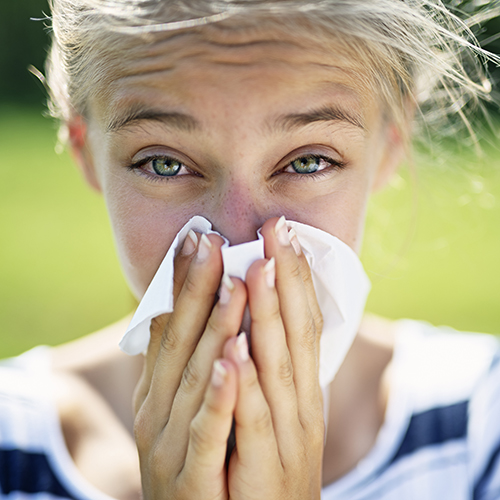06 June 2024
Hives, asthma, or eczema – they’re all very common symptoms of an allergic reaction. When mild, allergies cause irritation and discomfort, yet when severe, they can result in anaphylaxis and even death.
Now, health experts at the University of South Australia are calling for a renewed focus on allergy training for nurses to deliver allergy treatments, source reliable evidence-based resources and provide patient education to patients and their families across the health sector.
It’s a timely move ahead of World Allergy Week (23-29 June).
Currently, allergic disease affects more than four million Australians, with numbers expected to almost double in the next 20 years. About 40 to 50% of children experience symptoms of an allergic disease in their first four years of life.
Experienced allergy registered nurse and lecturer, UniSA’s Dr Deryn Thompson, says the growing demand for medical services, particularly in relation to allergic disease, is a serious public health issue, as underlined by the National Allergy Council.
“With allergies and anaphylaxis on the rise in Australia, it’s crucial for nurses to provide specific and accurate allergy care and education,” Dr Thompson says.
“Nurses, especially those in primary healthcare (such as GP nurses) must be able to explain allergies and correct misconceptions about allergies, intolerances and the use of mail-order tests and treatment.
“Nurses can be at the front line of providing evidence-based best practice information and resources and advocate for early intervention.
“Currently, nurses need to self-fund their postgraduate studies which means many struggle to access affordable allergy training, leaving them underequipped to support allergy patients.
“The National Allergy Council wants to make allergy care more accessible to patients across Australia, which puts nurses in a prime position to deliver this with additional training and knowledge.”
The recent announcement of a $50.2 million federal investment to upskill Australian nurses could be the key to expanding allergy education among registered nurses to specialise in primary healthcare.
UniSA’s Professional Certificate in Allergy Nursing is the only allergy nursing course of its kind in Australia. Offered collaboratively with the Australasian Society of Clinical Immunology and Allergy Incorporated (ASCIA) for nurses, the course provides nurses with the knowledge, skills, and attitudes to confidently care for children and adults with allergic conditions using best practice and care based on evidence.
“Growing pressure on health care services means many people are finding it hard to access allergy support, and primary healthcare is usually people’s first contact with the health system” Dr Thompson says.
“With the current push in health to place nursing at the forefront of workforce reforms, accessible allergy education services could change the outcomes for millions of Australians.
“All nurses should have access to these courses, not only because they provide another avenue for people to seek support and advice, but more importantly, they allow nurses to provide all Australians with the best care possible.
“Training nurses to deliver allergy advice and treatment will help reduce the burden on the Australian health system. We must make allergy training more available and accessible to all nurses across the primary healthcare system.”
……………………………………………………………………………………………………………………
Media contacts: Annabel Mansfield M: +61 479 182 489 E: Annabel.Mansfield@unisa.edu.au
Maddie Rawlings E: Maddie.Rawlings@unisa.edu.au
Registered nurse and allergy lecturer: Dr Deryn Thompson E: Deryn.Thompson@unisa.edu.au

